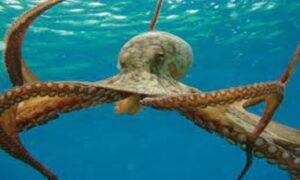Doctor Curmudgeon® Why I am Happy that I am Not an Octopus!
By Diane Batshaw Eisman, M.D. FAAP Doctor Eisman is in Family Practice in Aventura, Florida with her partner, Dr. Eugene Eisman, an internist/cardiologist
Octopuses are known for their intelligence.
I admit to being embarrassed when I discovered that octopuses can use tools. There are few tools that I am able to handle without at least a minor injury.
They astonish me by their ability to solve mazes to get food.
As far as opening a jar, I confess to yowling to my husband for help; while octopuses have learned to unscrew these tight lids by themselves!
Octopuses are so clever that they can even change the color of their bodies! This allows them to blend in with their surroundings in order to hide from predators.
But a young octopus has my compassion.
These babies are born to be orphans.
It is hard for me to understand such a disastrous fate.
By the time the baby octopus has erupted from its egg, its mother is dead. And only a few months after the octopus parents have mated, the father dies.
Octopuses are not social invertebrates. You won’t find one on any social media connecting with friends.
The only time they seem to get together is when they mate.
Once the female lays her eggs, she sticks around and her whole existence is devoted to their care. She does not even eat during this time, which can last for several months.
After the eggs have hatched, the mother’s organs of reproduction begin to atrophy and the octopus mama dies, leaving the young to fend for themselves.
From American Oceans: ‘The female octopus will eventually die, and her body will provide nourishment for her offspring.”
Carly Cassella says in Nature; “ After a female octopus lays her eggs, she stops eating and begins self- mutilating, tearing off her skin and biting off the tips of her tentacles.”
The baby octopi can now begin feasting on the remains of their mother. Their father has abandoned them and a short while later, he is also dead
In Animal Queries, Rima Chatterjee writes about the father’s demise: “The male’s reproductive system is designed to transfer sperm packets, called spermatophores, to the female during mating.
Once this task is complete, the male’s reproductive organs begin to deteriorate. As the male octopus’s reproductive organs deteriorate, so does his overall health”
Scientists have been looking into this mating phenomenon for quite a while.
A team of scientists led by Dr. Z. Yan Wang published a paper in Current Biology. These researchers were from the University of Washington, the University of Chicago and the University of Illinois.
The team found that “the optic gland in maternal octopuses undergoes a massive shift in cholesterol metabolism, resulting in dramatic changes in the steroid hormones produced. Alterations in cholesterol metabolism in other animals, including humans, can have serious consequences on longevity and behavior.”
And so, the octopus couple mate.
The eggs hatch.
After the young wriggle out, the female tears herself apart so her children can feast upon her.
Then after the mating, the optic gland of the father comes into play and secretes sex hormones, precursors of cholesterol and some insulin-like hormones. It is thought that the buildup of these in his body triggers his death.
Indeed, for some species, mating is a dangerous game.
Dr. Curmudgeon suggests “Bitter Medicine”, Dr. Eugene Eisman’s story of his experiences–from the humorous to the intense—as a young army doctor serving in the Vietnam War.
Bitter Medicine by Eugene H. Eisman, M.D. –on Amazon
Doctor Curmudgeon® is Diane Batshaw Eisman, M.D., a physician-satirist. This column originally appeared on SERMO, the leading global social network for doctors.
SERMO www.sermo.com
Click Here to Order Boxing Interviews Of A Lifetime By “Bad” Brad Berkwitt


